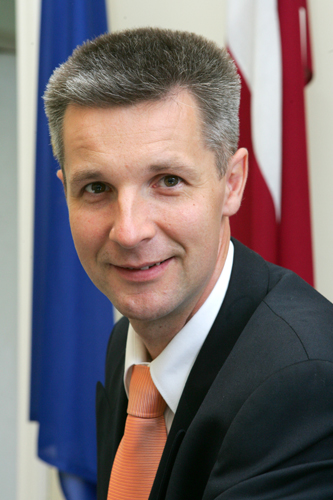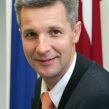
BALTIC STATES CLOSE RANKS WITH GEORGIA, JOIN U.S. TO INVESTIGATE MISSILE INCIDENT
Publication: Eurasia Daily Monitor Volume: 4 Issue: 158
By:

The Baltic states spoke out on Georgia from day one of the crisis triggered by the Russian missile drop on that country. On August 7, Latvian Minister of Foreign Affairs Artis Pabriks “strongly condemned the violation of Georgia’s sovereignty and territorial integrity.” Pabriks assured his Georgian counterpart, Gela Bezhuashvili, of Latvia’s support for an independent investigation and for raising the issue within the European Union (press release, August 7). Latvia’s recently elected President Valdis Zatlers telephoned Georgian President Mikheil Saakashvili to express solidarity.
The presidents and ministers of foreign affairs of Estonia and Lithuania issued statements in a similar vein, publicly as well as in direct communication with their Georgian counterparts (see EDM, August 8). Moreover, Estonian President Toomas Ilves called on the EU to speak up against the “unacceptable and brutal trampling of Georgia’s sovereignty”; while Minister of Foreign Affairs Urmas Paet telephoned the European Union’s Portuguese presidency, urging the EU to take a firm stand in the EU’s own interest in stability of its neighborhood. Lithuania’s Ministry of Foreign Affairs announced its readiness to raise the issue within NATO. As Lithuanian Prime Minister Gediminas Kirkilas observed, one major reason behind Russia’s harassment is to derail Georgia’s NATO aspirations by portraying it as a problematic and risky country.
Lithuania has initiated a meeting of the New Friends of Georgia group of countries, to be held on September 13 in Vilnius. Created in 2004 by the Ministries of Foreign Affairs of the three Baltic states, Romania, Bulgaria, and Ukraine, the group has met on an annual basis since then and is open to new member countries. For example, Azerbaijan — whether it decides to attend the Vilnius meeting or not — has proven to be a crucial friend of Georgia in the region, sharing economic burdens and political risks with Georgia.
In the New Friends’ group, Romania has also expressed support for Georgia following the Russian air incursion. Minister of Foreign Affairs Adrian Cioroianu confirmed to Bezhuashvili by telephone that Bucharest would join in raising the issue within the EU and NATO. Poland’s Ministry of Foreign Affairs has taken a similar stand, and President Lech Kaczynski announced his support for Saakashvili’s position (DPA, Radio Polonia, August 9).
The three Baltic states and Poland are joining the United States and several West European countries in an international group of military experts to investigate the August 6 Russian missile drop on Georgia. Airspace control specialists from the Baltic states’ defense ministries have already arrived in Georgia as part of this group.
Georgia has proposed the formation of this inter-governmental group of experts who would volunteer their services for a prompt investigation and a report on the findings. The group will act independently — that is, outside the framework of international organizations such as the United Nations or the OSCE, both of which can be paralyzed by Russia’s veto powers. Even the EU, hamstrung by differences among member countries over Russia policy, has often failed to respond adequately to Russian military pressures on Georgia.
On August 9-10, the UN Security Council turned down Georgia’s request for a UNSC session to discuss the missile drop. The Security Council’s incumbent presidency, which happens to be Congo, opined on behalf of some other countries as well that a discussion would be premature and should, in any case, await the results of an investigation by the OSCE. Barely one month earlier, the UN had exculpated Russia over the March air raid on Georgia, because the UNOMIG-led investigative team operated on the rule of consensus with Russia. Thus, Georgia received conclusive confirmation twice in the space of several weeks that relying on the UN for national security is not only pointless, but a downright counterproductive substitute for real measures.
For its part, the OSCE’s incumbent Spanish chairmanship merely urged Russia and Georgia in a public statement to show restraint and cooperate with one another in clarifying what had happened. Such evasion of responsibility has become almost a norm in recent years from OSCE chairmanships facing Russian pressures for budgetary and organizational “reforms.” In a follow-up statement, the chairman — Spanish Minister of Foreign Affairs Miguel Angel Moratinos — called for an investigation and announced the OSCE’s intention to cooperate with it. Thus, the OSCE, in effect, passed the ball to others — the best possible move for the organization, given its own internal dilemmas.
The EU’s incumbent Portuguese presidency followed a similar road — a disconcerting one for an organization not subject to Russian vetoes. The presidency urged Russia and Georgia equally to refrain from escalating — as if Georgia could even if it wanted; or as if the air raid had targeted Russia, not Georgia — and called for a “rapid, thorough, independent investigation.” Although it did not specify what authority might conduct such an investigation, the wording can usefully be cited as an implicit endorsement for the Georgian-sought probe by the inter-governmental group of experts acting independently.
(BNS, Civil Georgia, The Messenger, Interfax, OSCE and EU releases, August 8-13; see EDM, August 8, 13)




